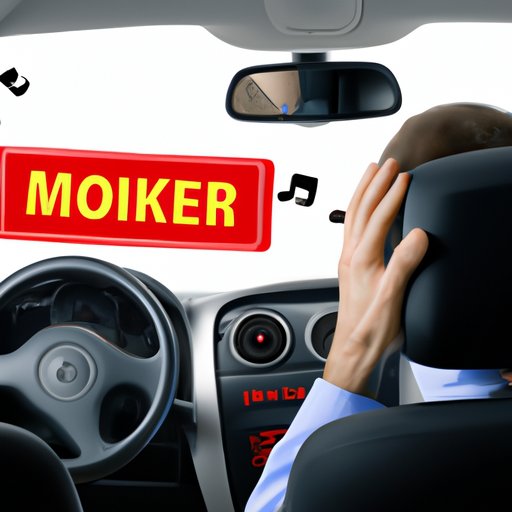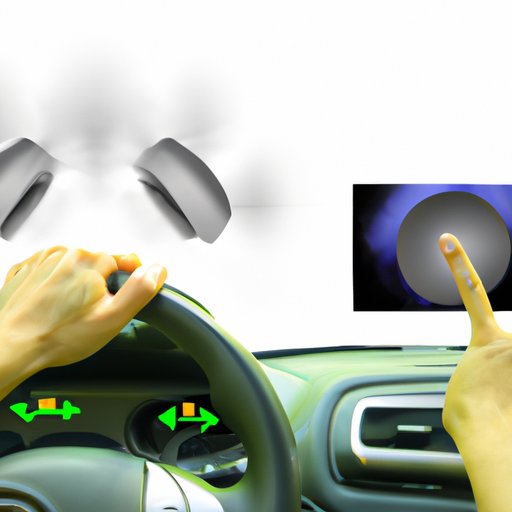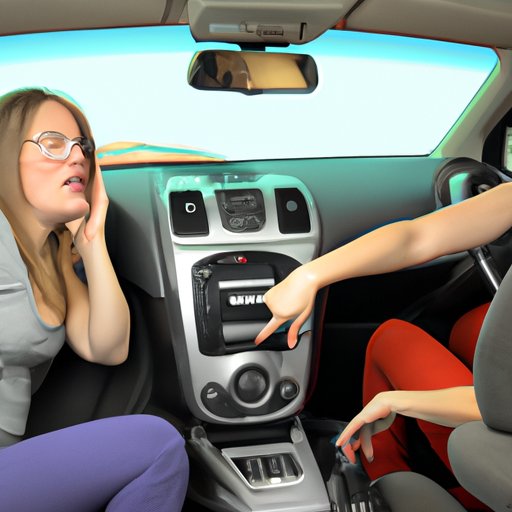Introduction
Playing loud music in a car can be an enjoyable pastime for many drivers and passengers. However, there are legal considerations that must be taken into account when it comes to playing loud music in a car. This article will explore the legal ramifications and safety impacts of playing loud music in a car, as well as the effectiveness of existing noise abatement laws for controlling the volume of music played in cars.
Comparing the Legalities of Playing Loud Music in Cars Across Different States
Noise abatement laws vary from state to state in the United States, making it important to understand the regulations in each state before playing loud music in a car. Generally speaking, most states have laws that restrict the volume of sound emitted from a car. These laws are intended to protect the public from excessive noise pollution.
Overview of Noise Abatement Laws
Noise abatement laws, or “sound ordinances,” regulate the amount of noise produced by motor vehicles, including cars, trucks, buses, and motorcycles. Many of these laws are designed to prevent excessive noise pollution, especially in residential areas. Depending on the state, the laws may specify how loud sound from a vehicle can be, and the distance from which it must be heard in order to be considered a violation.
Examining State-by-State Regulations
In California, for example, the law states that any sound from a car that is audible beyond 50 feet is considered too loud. Additionally, in some cities, such as Los Angeles, the law limits the maximum decibel level for sound from a vehicle to 70 decibels. In New York, the law states that any sound from a vehicle that is audible more than 25 feet away is considered too loud. Furthermore, New York City has specific limits on the maximum decibel level of sound from a car, with a maximum limit of 60 decibels.
Summarizing the Findings
The findings suggest that there are varying levels of regulation regarding the volume of music that can be played in cars across different states. While some states have relatively lax laws, others have stricter regulations in place. It is important to familiarize yourself with the laws in your state before playing loud music in a car.

Exploring the Legal Ramifications of Playing Loud Music in a Car
If you are caught playing loud music in a car, you may face legal consequences. Depending on the state, the penalties for violating noise abatement laws can range from fines to jail time.
Overview of Potential Penalties
In general, the penalties for violating noise abatement laws can include a fine, community service, probation, and even jail time. The severity of the penalty depends on the state and the circumstances of the offense. For instance, if the violation is a first offense, the punishment may be less severe than if it is a repeat offense. Additionally, some states allow judges to impose additional punishments, such as requiring the offender to attend counseling or classes on responsible use of sound equipment.
Investigating Other Factors that may Impact Punishment
In addition to the state laws, other factors may influence the penalty for playing loud music in a car. For instance, if the violation occurred in a residential area, the penalty may be more severe than if it occurred in a non-residential area. Additionally, if the music was excessively loud, the penalty may be more severe than if the volume was only slightly above the legal limit.
Understanding the Overall Impact of Playing Loud Music in a Car
Overall, playing loud music in a car can lead to serious legal consequences, depending on the state and the circumstances of the offense. It is important to understand the laws in your state before playing loud music in a car, and to be aware of the potential penalties for violating those laws.

Examining the Impact of Playing Loud Music in a Car on Driver and Passenger Safety
In addition to the legal implications of playing loud music in a car, there are also potential safety concerns. Distracted driving, impaired hearing, and increased risk of accidents are all potential risks associated with playing loud music in a car.
Investigating the Effects of Distracted Driving
Distracted driving is a major safety concern for drivers, and playing loud music in a car can contribute to this problem. When a driver is distracted by loud music, they may not be paying close enough attention to the road and other vehicles, which can increase their risk of being involved in an accident. Additionally, loud music can make it difficult for drivers to hear sounds such as sirens and horns, which can further increase the risk of an accident.
Examining the Effects of Impaired Hearing
In addition to increasing the risk of distracted driving, playing loud music in a car can also lead to impaired hearing over time. Prolonged exposure to loud music can damage the eardrums, leading to hearing loss and other issues. This can be particularly dangerous for drivers, as it can make it difficult for them to hear warning signals from other vehicles or pedestrians.
Understanding the Risk of Accidents from Loud Music
Finally, playing loud music in a car can increase the risk of accidents. The loud music can mask important sounds such as horns or sirens, making it difficult for drivers to react quickly to potential hazards. Additionally, the distraction of loud music can lead to delayed reactions and poor decision-making, further increasing the risk of an accident.

Investigating the Pros and Cons of Playing Loud Music in a Car
In addition to the legal and safety considerations, there are also pros and cons to playing loud music in a car. Understanding both sides of the issue can help drivers make informed decisions about whether or not to play loud music in their vehicles.
Understanding the Benefits of Listening to Music at High Volume
For many people, playing loud music in a car can be an enjoyable experience. Loud music can create a sense of energy and excitement, and can make long drives more enjoyable. Additionally, some people find that listening to loud music helps them stay focused and alert while driving.
Examining the Negative Impacts of Playing Loud Music in a Car
However, there are also potential negative impacts of playing loud music in a car. As discussed previously, loud music can lead to distracted driving, impaired hearing, and increased risk of accidents. Additionally, playing loud music in a car can be disruptive to other drivers and pedestrians, and can lead to legal repercussions.
Investigating the Effectiveness of Noise Abatement Laws for Playing Loud Music in a Car
Noise abatement laws are intended to reduce the amount of noise pollution caused by motor vehicles, including cars. But how effective are these laws when it comes to controlling the volume of music played in cars?
Evaluating the Efficacy of Existing Laws
The efficacy of existing noise abatement laws varies from state to state. In some states, the laws are relatively effective, while in others they are not as effective. Additionally, some states have more stringent laws than others, which can make enforcement of the laws more difficult.
Examining Ways to Improve Noise Abatement Laws
To improve the effectiveness of noise abatement laws, states should consider enacting stricter regulations, such as higher fines for violations or longer jail sentences. Additionally, states should consider implementing systems that allow for easier enforcement of the laws, such as technology that can measure the volume of sound from a car.
Conclusion
In conclusion, playing loud music in a car can have serious legal and safety implications. States have varying levels of regulation when it comes to controlling the volume of sound emitted from a vehicle, and violators may face serious penalties. Additionally, playing loud music in a car can lead to distracted driving, impaired hearing, and increased risk of accidents. Ultimately, it is important to be aware of the potential risks associated with playing loud music in a car, and to familiarize yourself with the laws in your state before playing loud music in a car.
More research is needed to evaluate the effectiveness of existing noise abatement laws, as well as ways to improve them. Additionally, further investigation is needed to examine the potential benefits and drawbacks of playing loud music in a car, and to better understand the safety implications of playing loud music in a car.
(Note: Is this article not meeting your expectations? Do you have knowledge or insights to share? Unlock new opportunities and expand your reach by joining our authors team. Click Registration to join us and share your expertise with our readers.)
